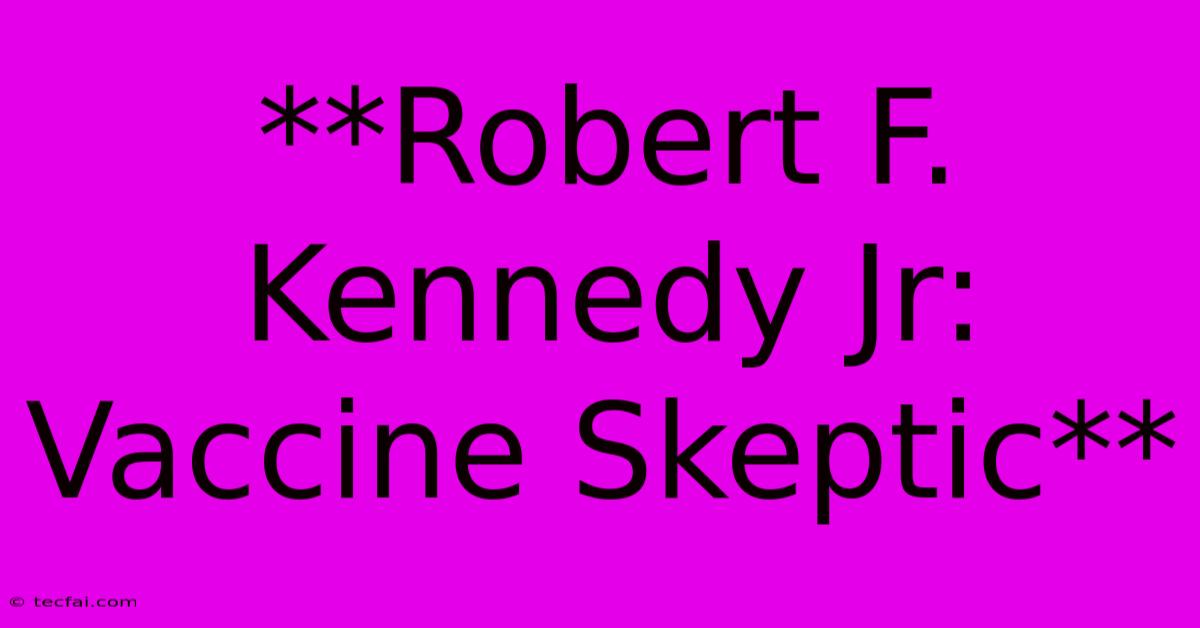**Robert F. Kennedy Jr: Vaccine Skeptic**

Discover more detailed and exciting information on our website. Click the link below to start your adventure: Visit Best Website tecfai.com. Don't miss out!
Table of Contents
Robert F. Kennedy Jr: Vaccine Skeptic and Anti-vaccine Activist
Robert F. Kennedy Jr., a prominent environmental lawyer and member of the renowned Kennedy family, is a highly controversial figure known for his outspoken skepticism—some would say, outright opposition—towards vaccines. This stance has garnered him significant attention, both positive and overwhelmingly negative, transforming him into a leading voice within the anti-vaccine movement. While Kennedy frames his activism as a fight for safer vaccines and greater transparency within the pharmaceutical industry, his views are widely rejected by the scientific community and public health organizations. This article delves into his arguments, the criticisms leveled against him, and the far-reaching consequences of his activism.
The Core of Kennedy's Vaccine Skepticism
Kennedy's anti-vaccine views center on several key arguments:
-
Claims of vaccine-induced autism: This is perhaps his most widely publicized assertion, connecting vaccines, specifically the MMR (measles, mumps, rubella) vaccine, to the development of autism. This claim has been repeatedly debunked by numerous large-scale studies and is not supported by scientific consensus. The original study that fueled this theory was retracted due to fraudulent research practices.
-
Allegations of pharmaceutical industry corruption: Kennedy frequently accuses pharmaceutical companies of prioritizing profits over safety, suppressing research that contradicts their narrative, and influencing regulatory bodies. While concerns about pharmaceutical industry practices exist, Kennedy’s assertions often lack credible evidence and rely on anecdotal evidence and conspiracy theories.
-
Advocacy for "safer" vaccines: He advocates for slower vaccine schedules, arguing that children's immune systems are overwhelmed by the current vaccination regimen. This suggestion, too, is not backed by scientific evidence and contradicts the established safety and efficacy of the current vaccine schedules.
-
Emphasis on natural immunity: Kennedy promotes the idea that natural immunity, acquired through infection, is superior to vaccine-induced immunity. While natural immunity can offer protection, it often comes at the cost of severe illness or even death, and lacks the predictable and consistent protection offered by vaccination.
The Criticism and Controversy Surrounding Kennedy
Kennedy's activism has faced intense criticism from various quarters:
-
Scientific community rejection: The overwhelming majority of scientists, medical professionals, and public health organizations reject Kennedy's claims as unsubstantiated and dangerous. His assertions have been refuted by countless peer-reviewed studies and scientific consensus statements.
-
Misinformation and disinformation: Critics accuse him of spreading misinformation and disinformation, contributing to vaccine hesitancy and potentially leading to outbreaks of preventable diseases. His public pronouncements have been linked to a decline in vaccination rates, jeopardizing public health.
-
Lack of scientific rigor: Kennedy’s arguments often lack the scientific rigor required for credible claims. He relies heavily on anecdotal evidence, cherry-picked data, and unsubstantiated allegations.
-
Potential for harm: His anti-vaccine rhetoric has been linked to real-world consequences, including outbreaks of measles and other preventable diseases. The potential harm caused by his actions is a significant and serious concern.
The Impact of Kennedy's Activism
Robert F. Kennedy Jr.'s influence extends far beyond his public statements. His high profile and family name give significant weight to his arguments, even in the face of overwhelming scientific evidence to the contrary. His activism has undoubtedly contributed to the rise of vaccine hesitancy and anti-vaccine movements worldwide, posing a serious threat to global public health.
The debate surrounding vaccines is complex, and it's crucial to rely on credible sources and scientific evidence when making decisions about vaccination. While concerns about vaccine safety and the pharmaceutical industry are legitimate areas for discussion and investigation, they should be addressed through responsible scientific inquiry and not through the propagation of misinformation and unsubstantiated claims. The consequences of undermining public trust in vaccines are far-reaching and potentially devastating.

Thank you for visiting our website wich cover about **Robert F. Kennedy Jr: Vaccine Skeptic**. We hope the information provided has been useful to you. Feel free to contact us if you have any questions or need further assistance. See you next time and dont miss to bookmark.
Featured Posts
-
King Charles Embraces New Chapter In Life
Nov 15, 2024
-
Maori Lawmakers Halt Nz Parliament Session
Nov 15, 2024
-
Trump Picks Rfk Jr For Hhs
Nov 15, 2024
-
Redmaynes Jackal High Ratings
Nov 15, 2024
-
Greece Vs England Live Score And Post Match Analysis
Nov 15, 2024
